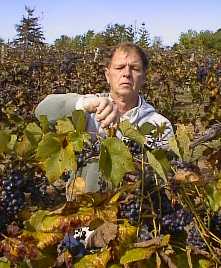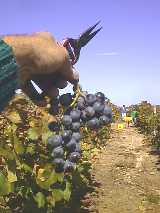Solace on the Vine

Rippelmeyer is a grape grower in the small, unincorporated town of Rosati, Missouri, founded by Italian immigrants in the mid 1800's. He leases 32 acres for vineyards, here in the foothills of the Ozark Mountains, and produces 100 tons of Concord, Catawaba and Stark Star grapes each year. His vineyard is one of the largest Concord grape producers in the state.
In his early fifties, Rippelmeyer has been growing grapes since 1986. His family owns 4M vineyards (Marvin, Mike (his son) Michelle (his daughter) and Margie (his wife, now deceased)) and, with his present wife, Donna, they recently bought the 75 year-old Rosati Winery, now more or less a gift shop and winery museum.
Rippelmeyer will make about 1000 jars of jelly this year, but not only grape - also blackberry, elderberry and strawberry jellies. This is part of what he does during the nine months each year that he isn't harvesting and selling his grapes. The other part is pruning the vines. "It takes about 150 man-hours per acre to prune, cultivate and harvest grapes," he says.
We are harvesting some of his grapes, off of Road 3644 in Rosati. I'm loading up a bin with Stark Star, delicious grapes that look like giant blueberries and have a strong, sweet, grape taste. I can't help but taste-test a few here and there, and Rippelmeyer gives me a sour look - not because I'm eating his profits, but because I'm spitting out the seeds. "Kids today have been spoiled by seedless grapes," he says. "I've even seen people peel the skin off of them."
I try swallowing a few seeds out of courtesy (no, make that "out of intimidation") and I don't mind it, actually. "What you don't use, you get rid of the next day, anyway," he says. I can't wait.
The grapes I pick today will go into a wine called Hunter's Red, from Hebron Wineries. Rippelmeyer sells about 75 tons of grapes to wineries each year.
For the grower, hearty grapes are a beautiful sight, but, as in most agriculture, there is a downside. A grapevine will put most of its nutrients into the grapes, and when the grapes are large, the vine (called a "cane") will be smaller. This means that next year the vine will produce a smaller grape. "Out of a ten year period, I'll only have two vintage years, and last year was one," Rippelmeyer says. "The rest will be average. But you pretty much never know if you have a vintage year until they're in the bottle."
This is simple, relaxing work, shearing grapes off the vines and dropping them into bins. The vines are tall and are supported with stakes and wires, so there is little bending involved, but you are certainly on your feet all day. It is more enjoyable when I am on a good, strong vine with hearty grapes that yield a large bunch with each clipping - they feel nicer in the hand and they fill the bin faster. Some growers pay their pickers by the bin - sometimes about a dollar - and one picker loaded 137 bins in a day, Rippelmeyer says. He pays by the hour, because he says the quality is better that way.
Finding good pickers is getting harder and harder, according to Rippelmeyer. He and a friend were talking this morning about the frustrations of hiring pickers and were discussing hiring Mexicans, something neither of them apparently had much experience with. "They're good workers and they want to work," Rippelmeyer said.
"You just need to be able to speak to them - sometimes they pretend not to understand you," his friend replied.
"They usually come with someone who also speaks English," Rippelmeyer said. I was surprised that this is new to them, and this just shows my ignorance of the migrant worker situation.
But labor isn't Rippelmeyer's only problem. He has plenty to worry about; disease, fungus, rain, grape prices and customers, to name a few. He works year-round, either selling grapes at the stand or working the vines, and, with the purchase of the winery, he has even more stress. "I'm further in debt now than I've ever been!" he says. But it is obvious that he loves growing grapes and that makes it worth all the trouble.
 Monday, October 19, 1998, Rosati, Missouri -
Marvin Rippelmeyer has spent a lifetime teaching. He has spent a lifetime helping to form the minds of children as they mature into young adults. He gave up this vocation last year to work solely on his love of agriculture, and today he spends his time working with grapevines, caring for them, pruning them, forming them through the years as they produce buds which mature into grapes.
Monday, October 19, 1998, Rosati, Missouri -
Marvin Rippelmeyer has spent a lifetime teaching. He has spent a lifetime helping to form the minds of children as they mature into young adults. He gave up this vocation last year to work solely on his love of agriculture, and today he spends his time working with grapevines, caring for them, pruning them, forming them through the years as they produce buds which mature into grapes.
 The Rippelmeyers have two roadside grape stands - the only ones remaining in this area. Both are on Route 66 and on Interstate 44 (people park right on interstate 44, cross the shoulder and cross Route 66 to get to the larger stand - it's a tradition...) He also makes grapes for wine, jams and jellies.
The Rippelmeyers have two roadside grape stands - the only ones remaining in this area. Both are on Route 66 and on Interstate 44 (people park right on interstate 44, cross the shoulder and cross Route 66 to get to the larger stand - it's a tradition...) He also makes grapes for wine, jams and jellies.


Rippelmeyer taught Vocational Agriculture and science in public schools, then spent a decade teaching deliquent boys at the Missouri Boys Town and got a little burned out on teaching. "Education has gotten to the point where it's a pretty tough go," he says. "At Boys Town, it's even harder; about 50 percent of the kids are OK, 25 percent are a challenge and 25 percent are hopeless."
"A success story?" he says. "If a kid leaves and he robs a 7-11 and because he went to Boys Town he didn't shoot the clerk, that's a success story."
And so, it is with his grapes that Rippelmeyer finds solace in his life. He has put in his time teaching youth, both good and bad, both challenging and hopeless, and now it's time for him. It's time for Marvin Rippelmeyer to enjoy the fruits of his labors.
Return to our
MAIN page
